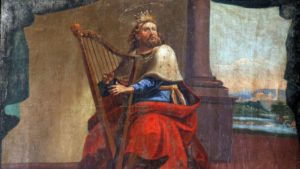Isaiah 55:3 – The Blessings of David
 Although David’s name is written only ten times in all the book of Isaiah, his memory was highly honoured in Isaiah’s time. King David had established the throne in Jerusalem almost three centuries earlier. He was the patriarch and hero of Jerusalem’s royal family.
Although David’s name is written only ten times in all the book of Isaiah, his memory was highly honoured in Isaiah’s time. King David had established the throne in Jerusalem almost three centuries earlier. He was the patriarch and hero of Jerusalem’s royal family.
Isaiah 7:2,13
In Isaiah’s time, the royal family of Jerusalem was known as “the house of David” because it descended from King David who had established the throne in Jerusalem almost three centuries earlier.
At David’s death, his son Solomon had become king. However Solomon, whose name is not written at all in Isaiah, had sinned against God. Therefore Solomon’s son Rehoboam was allowed to be king only of Judah and the little tribe of Benjamin attached to it. All the other ten tribes of Israel became a second and separate kingdom. A new throne, a new royal family, and a new capital city was established to the north in Samaria. As for Judah, the royal house of David continued to reign in Jerusalem, the “city of David” (see 1 Kings 11:26-40).
Isaiah was a prophet in Judah during the reign of kings Uzziah, Jotham, Ahaz, and Hezekiah (2Chronicles chapters 26 to 32). Except for Ahaz, these were good kings in Judah, after the heart of David their ancestor.
Isaiah 9:7
Isaiah always kept in mind that God had sworn with an oath to David to seat one of his descendants upon his throne to rule forever (2 Samuel 7:12-14,Psalms 89:3-4).
Although Isaiah speaks of many lamentable things, there is this strong hope (Isaiah 9:6-7). Jeremiah was preaching the same a century later, and Ezekiel later still (Jeremiah 30:9,Ezekiel 37:24-25).
Isaiah 16:5
The word “tabernacle” means a temporary or portable dwelling such as a tent. The house of worship in David’s time was still a tabernacle. David wished to build a more substantial house for God, but God would not let him. It was David’s son who built the great temple to replace the tabernacle (1Chronicles 17:1-12). In Isaiah’s time this great temple dominated Jerusalem. Even in Isaiah’s prophecies and heavenly visions “the house of the Lord“ was a temple (Isaiah 2:2-3, 6:1-4). Isaiah sorrowfully foretells the destruction of this temple (Isaiah 64:8-12).
By building a glorious temple, man is liable to patronize God rather than being humble before him. Through Isaiah the Lord points this out most clearly (Isaiah 66:1-2).
Isaiah 22:9, 29:1
It was David himself who called Jerusalem or Zion “the city of David” after he had taken the city from the Jebusites (2 Samuel 5:4-12). There he made his home, there he set his throne, and to there he transported the ark of the covenant and set up the tabernacle. There he built a great capital for his kingdom. In Isaiah’s time Jerusalem was still the capital of Judah and the seat of the royal house of David.
A century after Isaiah’s time Jerusalem was destroyed. On its ashes and rubble a new city was painfully rebuilt. Forty years after the time of Christ the city was destroyed again. Yet today it stands as a great and special city upon the earth.
David was remembered, and his name honoured in the time Isaiah. King David, who had established the throne in Jerusalem almost three centuries earlier, was the hero of Jerusalem’s royal family.
In contrast, the New Testament has its own way of interpreting these verses.
The kingship of Jesus is combined with his high priesthood. Just as the throne of David had foreshadowed Jesus’s kingship, the “tabernacle of David” symbolized Jesus ’s priesthood (Hebrews 9:1-15).
Referring to passages in Isaiah 22:22, Isaiah 37:35, Isaiah 38:5, Jesus calls himself “He who is holy, who is true, who has the key of David, who opens and no one will shut, who shuts and no one opens…” (Revelation 3:7).



